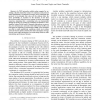Free Online Productivity Tools
i2Speak
i2Symbol
i2OCR
iTex2Img
iWeb2Print
iWeb2Shot
i2Type
iPdf2Split
iPdf2Merge
i2Bopomofo
i2Arabic
i2Style
i2Image
i2PDF
iLatex2Rtf
Sci2ools
103
click to vote
CDC
2009
IEEE
2009
IEEE
Resource sharing optimality in WiFi infrastructure networks
Abstract— In WiFi networks, mobile nodes compete for accessing a shared channel by means of a random access protocol called Distributed Coordination Function (DCF). Although this protocol is in principle fair, since all the stations have the same probability to transmit on the channel, it has been shown that unfair behaviors may emerge in actual networking scenarios. Assuming that a contending node can dynamically change its strategy, by tuning its contention parameters to nonstandard values on the basis of channel observations, we prove that, for infrastructure networks with bidirectional traffic and homogeneous application requirements, selfish access strategies are able to reach equilibrium conditions, which are in many cases also Pareto optimal. Indeed, the station strategies converge toward values which maximize a per-node utility function, while maintaining performance fairness.
Abstract— In WiFi | CDC 2009 | Control Systems | Distributed Coordination Function | Random Access Protocol |
Related Content
| Added | 21 Jul 2010 |
| Updated | 21 Jul 2010 |
| Type | Conference |
| Year | 2009 |
| Where | CDC |
| Authors | Laura Giarré, Giovanni Neglia, Ilenia Tinnirello |
Comments (0)

